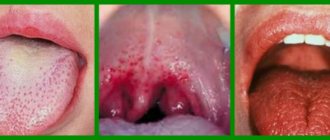The smell of acetone on your breath - does diet matter?
The content of the article
An acetone odor from the breath is felt in people on a low-sugar diet. A decrease in the concentration of carbohydrates leads to the fact that the main source of energy for the body becomes fats, which form ketone bodies. Fats will also be the main source of energy received by the body in case of fasting and a small supply of sugars.
Symptoms of elevated ketone levels due to the ketogenic diet:
- Smell of acetone from the mouth.
An increased concentration of ketones is indicated by a noticeable smell of sour apples from the mouth. - Decreased activity
. Reducing the intake of carbohydrates initially leads to a feeling of constant fatigue, dizziness and nausea. Physical strength also decreases. This state lasts for several days or weeks until the body begins to burn more fat and switches to a new source of energy. - Disruption of the gastrointestinal tract
. The ketogenic diet can also lead to diarrhea and constipation. - Insomnia.
Sleep disturbances are a kind of signal from the body about carbohydrate deficiency. - Decreased appetite.
Patients begin to lose weight and appetite. This is due to the fact that a decrease in the concentration of carbohydrates in the blood leads to a decrease in the concentration of insulin and an increase in glucagon, which stimulates the oxidation of fatty acids. Increased protein degradation when using this diet can lead to negative consequences due to protein deficiency.
A low-carbohydrate, low-fat diet that leads to ketosis has long been used to treat epilepsy, especially in children.
Possible reasons
What disease causes a person to smell of acetone? The accumulation of ketones can occur with various ailments. Most often, ketoacidosis develops against the background of the following pathological conditions:
- diabetes mellitus;
- pathologies of the liver and kidneys;
- disorders of the thyroid gland;
- infectious diseases;
- deficiency of carbohydrates in food;
- long fasting.
Next, we will consider in detail the above diseases and methods of treating them.
Acetone breath and diabetes
Diabetes is a group of metabolic diseases that involve hyperglycemia—high blood sugar levels—associated with impaired insulin function or secretion. The patient's body, which cannot use carbohydrates as a source of energy as a result of impaired insulin secretion or action, begins to use fats for this purpose. As a result, ketone bodies are formed, which is the reason for the smell of acetone in the mouth. Some patients compare this smell to the smell of acid, gas or gasoline.
Chronic hyperglycemia causes damage to various organs, mainly the kidneys, eyes, blood vessels, heart and nerve fibers. There are several types of diabetes:
- type 1 diabetes;
- type 2 diabetes;
- gestational diabetes.
Type 1 diabetes is characterized by an absolute lack of insulin due to the destruction of beta cells in the pancreas. But the most common form of diabetes is type 2, which is characterized by impairment of both insulin secretion and function.
Diabetes
Typical symptoms of diabetes: increased thirst, polyuria, dehydration, drowsiness and weakness.
Liver diseases
If a person smells of acetone when breathing, this may indicate liver pathology. It is in this organ that the process of breakdown of fatty acids and the formation of ketone bodies occurs. When liver cells are damaged, lipid metabolism is disrupted. This leads to the accumulation of ketones.
Most often, ketoacidosis occurs with hepatitis. Liver inflammation is accompanied by the following symptoms:
- yellowing of the mucous membranes and whites of the eyes;
- skin itching;
- a feeling of heaviness on the right under the ribs;
- fatigue;
- nausea;
- poor appetite.
The patient is prescribed hepatoprotectors, antiviral drugs, as well as a diet limiting spicy, salty and fatty foods.
Smell of acetone on the breath - ketoacidosis
Patients with diabetes can develop a life-threatening complication called ketoacidosis. This is a complex of acid-base disorders in which ketones appear in the urine and blood. This condition occurs as a result of insulin deficiency. Ketone bodies are most often produced in patients with type I diabetes, but may be present in test results in patients with other types of diabetes.
Sour breath is not the only symptom of this type of metabolic acidosis. Dehydration, glucose in the urine, electrolyte disturbances, disturbances of consciousness, feelings of weakness, drowsiness, vomiting, nausea, abdominal pain, chest pain, headache, dizziness, flushing, rapid heartbeat and rapid breathing are also observed. Without treatment, acidosis can cause coma.
In addition to diabetes, ketoacidosis and therefore acetone breath can cause:
- bacterial, fungal, viral infections, which increase the need for insulin;
- errors in insulin treatment;
- heart attack and stroke;
- pancreatitis.
Diagnostics
The initial examination of patients is carried out by a general practitioner, who, if pathognomonic signs of damage to a certain organ are detected, gives a referral to a highly specialized specialist. To find out why the taste of acetone appeared in the mouth, advanced laboratory tests and modern instrumental studies are prescribed. The most informative in diagnostic terms are:
- Standard blood tests
. A general blood test evaluates the level of leukocytosis and ESR, which helps to exclude infectious causes of unpleasant taste. A biochemical blood test shows the condition of the liver and biliary system, the degree of decrease in kidney function. In case of disturbances of consciousness, arterial blood gasometry is recommended. - Determination of hormone levels
. It is imperative to examine the fasting insulin concentration; to confirm the diagnosis of diabetes mellitus, an oral glucose load test and measurement of C-peptide levels and a test for acetone in the urine are important. Young women undergo a pregnancy test, taking into account the amount of estrogen and progesterone, hCG. - Ultrasonography
. Targeted ultrasound of the pancreas allows us to identify areas of destructive changes in the parenchyma, cysts or neoplasms that affect insulin synthesis. Using ultrasound, hepatic pathology is diagnosed, and the degree of fibrosis is determined by non-invasive elastometry. - X-ray imaging
. Abdominal CT facilitates the differential diagnosis of inflammatory and destructive liver diseases. An MRI of the brain is performed to rule out a neurological cause for the acetone taste in the mouth. Scintigraphy of the thyroid gland is needed to determine the degree of hyperfunction of the organ. - Invasive methods
. To confirm the etiological factor of liver damage, a percutaneous or transvenous biopsy is performed, followed by histological examination. A puncture biopsy of the thyroid gland is used to identify acute thyroiditis and autoimmune processes that are accompanied by thyrotoxicosis.
To verify the cause of unpleasant taste sensations when exogenous intoxication is suspected, an extended toxicological blood test is indicative. Virological studies are necessary to diagnose viral hepatitis. For patients with inappropriate behavior, examination by a neurologist or psychiatrist and an EEG are required. In the diagnosis of renal failure, data on GFR and creatinine clearance are informative.
Acetone smell from child's mouth
Children's breath smells like acetone most often due to type I diabetes. The disease develops slowly and insidiously, so parents often do not know that their child is sick. In addition, young patients often experience weight loss, excessive thirst, weakness, and pollakiuria.
This type of odor can also occur when a child doesn't drink enough. Sometimes parents report an ammonia odor from their child's mouth during an infection such as pharyngitis.
A strange smell from the mouth should prompt parents to contact a pediatrician, who will prescribe the necessary examinations.
Renal pathologies
Why does a person's body smell like acetone? This may be due to kidney disease. With nephrosis, metabolism is disrupted. As a result, the excretion of ketones through the kidneys increases. The acetate odor comes from the patient's urine and sweat.
Nephrosis is a disease accompanied by degenerative changes in kidney tissue. The signs of pathology are as follows:
- increased thirst;
- weakness;
- swelling of the face and limbs;
- decreased amount of urine;
- joint pain.
Without treatment, this disease can lead to kidney failure. Usually a person smells of acetone in the early stages of the disease. As the pathology develops, an ammonia smell appears. This indicates a significant deterioration in kidney function.
The patient is prescribed a diet with a high protein content in food and limited salt and water. Corticosteroids and diuretics are indicated.
Prevention measures
Parents whose child is prone to this disease should have glucose and fructose preparations in their home medicine cabinet. Also, you should always have dried apricots, raisins, and dried fruits on hand. The baby's meals should be fractional (5 times a day) and balanced. As soon as any sign of an increase in acetone appears, you should immediately give the child something sweet.
Children should not be allowed to overexert themselves, either psychologically or physically. Daily walks in nature, water procedures, normal eight-hour sleep, and hardening procedures are shown.
Between attacks, it is good to carry out preventive treatment of crises. This is best done in the off-season twice a year.
Anemia
A metallic taste from the mouth indicates the development of anemia. It develops against the background of an increase in the concentration of metal ions in the body. With anemia, the transport of hemoglobin is impaired. It is also sometimes called iron. As a result, a complete imbalance of the human condition begins.
Naturally, such a problem should not be ignored: any manifestations of some foreign aroma should be determined by taking tests and consulting with a specialist. You can start with a therapist: he will be alert to a particular disease and will offer examination options, and then therapy. You cannot leave the situation to chance, hoping that it will go away on its own. After all, there is a risk of the pathological process turning into a chronic one: treating it, as we know, is much more difficult, longer and more expensive. And the result is unpredictable.
There are contraindications, you should consult your doctor
How to overcome unpleasant amber
It’s worth noting right away that the aroma will completely disappear only when the breakdown of alcohol leaves the body. However, you can take some measures that will help you quickly overcome this unpleasant condition:
- you need to take a shower in the morning;
- You can overcome the smell by drinking coffee, sweet drinks or mineral water;
- you can also drink brine, which will quickly kill the amber;
- Be sure to brush your teeth and rinse your mouth;
- Lollipops and chewing gum will help temporarily relieve a person of the smell.
But before overcoming this phenomenon, it is worth carefully studying its symptoms - suddenly the acetone smell appeared not as a result of drinking alcohol, but due to the development of a pathology in the body that requires urgent treatment.
(Visited 36,058 times, 5 visits today)
Hyperthyroidism
The smell of iodine from the mouth also indicates problems in the body. Usually, when such a signal appears, doctors send the person to be checked for problems with the thyroid gland, in particular hyperthyroidism. It is this gland that is associated with iodine. When the body has a problem with the production of hormones, it does not have enough capacity to work properly and dispose of everything unnecessary and excess, the accumulation of substances begins. Hence the smell. Also, sometimes the appearance of an iodine odor indicates problems from taking hormonal medications. And sometimes it appears during tooth decay as an oxidative reaction.
Question answer
How to eliminate the smell of onions and garlic?
Thyroid dysfunction
The appearance of a ketone odor may be one of the signs of thyrotoxicosis. With this pathology, the thyroid gland produces an excess amount of hormones. This leads to the following symptoms:
- severe weight loss;
- bulging eyes;
- enlargement of the front of the neck (in severe cases, a goiter appears);
- tachycardia;
- nervousness;
- excessive sweating and feeling hot;
- fatigue;
- tremor of the limbs.
Why does a person smell like acetone with thyrotoxicosis? Thyroid hormones stimulate the fat burning process. Their excess leads to accelerated lipid metabolism. As a result, the patient loses a lot of weight, and ketone bodies accumulate in his body. This is what causes the smell.
A patient with thyrotoxicosis needs to take iodine-based medications. After normalization of the thyroid gland, the unpleasant odor disappears.
Risk factors for the appearance of an acetone odor when drinking alcohol
If a person constantly drinks beer or other drinks, the risk of increased odor increases significantly. But some pathologies can also contribute to this, such as:
- food imbalance;
- diseases of the kidneys or pelvis;
- inflammation of the thyroid gland;
- heart diseases;
- disruptions in liver function;
- the development of a viral infection in a person, which leads to an increase in temperature.
If the drinker has one of the above diseases, then the risk of an acetone smell increases greatly. In addition, in this case, the smell from the mouth will last much longer.
Since the reasons for this phenomenon have become clear, we now need to understand whether drinking alcohol actually influenced the appearance of the smell.
To do this, it is important to know the symptoms and signs indicating that the “amber” actually appeared due to alcohol.









